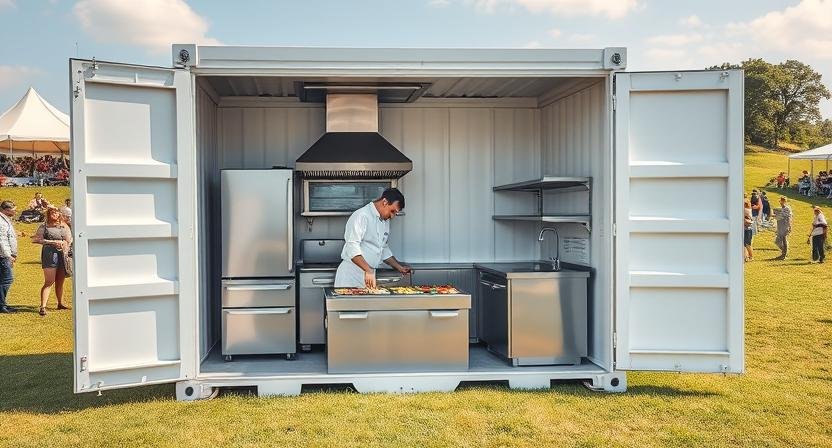In the dynamic world of food service, events, and facility management, the ability to adapt is paramount. Whether it’s a bustling music festival, a corporate catering gig, a restaurant undergoing renovations, or a temporary pop-up in a trendy neighborhood, the need for a fully functional kitchen is absolute. However, building a permanent kitchen is not always feasible, cost-effective, or even possible. This is where the concept of TK Rental comes into play, offering a flexible and efficient solution to a critical logistical challenge.
TK, an abbreviation for “Temporary Kitchen,” refers to the practice of renting a fully-equipped, mobile kitchen unit for a specified period. This industry has evolved significantly, moving beyond simple food trucks to encompass a wide range of sophisticated, self-contained culinary environments. This article will delve into the world of TK rental, exploring its applications, benefits, key components, and the considerations involved in securing the right setup for your needs.
Table of Contents
What Exactly is a TK Rental?
At its core, a TK rental is the short-term or long-term lease of a mobile kitchen facility. Unlike a permanent kitchen, which is built into a fixed structure, a TK is designed for mobility and rapid deployment. These units are typically housed within shipping containers, trailers, or large tents, and are pre-fitted with the essential equipment needed for professional food preparation.
The scope of a TK can vary dramatically. A basic unit might include simple refrigeration, a griddle, and a fryer, suitable for a concession stand. A high-end, comprehensive TK, however, could rival a permanent restaurant kitchen, featuring convection ovens, ventilation hoods, multiple workstations, dedicated sanitation areas, and even climate control. The versatility of the TK model is its greatest strength, allowing it to be tailored to the specific demands of the user.
Primary Applications and Use Cases for Temporary Kitchens
The demand for TK rentals springs from a variety of sectors. Their application is limited only by imagination, but some of the most common uses include:
1. Major Events and Festivals:
Large-scale events like music festivals, sporting events, and street fairs require a high volume of food and beverage service for thousands of attendees. Permanent kitchen infrastructure is rarely available on-site. Event organizers rent multiple TKs to host a diverse array of food vendors, ensuring a wide selection for guests while managing health and safety standards in a centralized manner.
2. Business Continuity and Renovation:
For an established restaurant, a kitchen renovation can mean weeks or months of lost revenue. Instead of closing entirely, many savvy restaurateurs opt for a TK rental. Placed in the parking lot or an adjacent space, the TK allows the business to continue operating, perhaps with a limited menu, while the permanent kitchen is upgraded. This maintains customer loyalty and provides a crucial revenue stream during a disruptive period.
3. Pop-Up Restaurants and Culinary Concepts:
The pop-up restaurant trend thrives on novelty and low overhead. Chefs and entrepreneurs use TK rentals to test new concepts, build buzz, and enter a market without the massive financial commitment of a long-term lease and construction. A TK can be installed in an empty warehouse, a rooftop, or a park, creating a unique dining experience for a limited time.
4. Film and Television Production:
On-location film sets, often situated far from established food services, need to feed large casts and crews multiple times a day. Production companies rent “craft service” TKs that are capable of producing hundreds of high-quality meals efficiently, adhering to strict schedules and dietary requirements.
5. Emergency and Humanitarian Relief:
In the aftermath of natural disasters, when infrastructure is destroyed, temporary kitchens become vital. Relief organizations deploy TKs to provide hot meals to displaced populations and emergency responders. These units are designed for rugged conditions and can often operate with independent power and water sources.
6. Seasonal Operations:
Businesses in tourist destinations that experience seasonal peaks, such as beach towns or ski resorts, can benefit from TKs. They can scale their operations up during the busy season without investing in a permanent structure that would sit idle for the rest of the year.
Key Components of a Standard TK Rental Unit
While configurations vary, a well-equipped temporary kitchen will generally include several key components:
- Structural Shell: The foundation, usually a weatherproof and secure trailer or container.
- Cooking Equipment: This is the heart of the TK, including ranges, ovens, fryers, griddles, and grills. The selection is based on the intended menu.
- Refrigeration and Freezing: Essential for food safety, including reach-in coolers, freezers, and sometimes prep tables with built-in refrigeration.
- Ventilation System: A critical safety feature, consisting of heavy-duty exhaust hoods and fire suppression systems to manage heat, smoke, and grease.
- Food Preparation Stations: Stainless steel counters and sinks for prepping ingredients, complying with health code requirements for separate areas for raw and ready-to-eat foods.
- Sanitation Station: A dedicated area with multiple-compartment sinks for washing, rinsing, and sanitizing dishes and utensils.
- Utility Hookups: Points for connecting to external power (generators or grid), water, and fuel (propane or natural gas). Many units can also be equipped with internal water tanks and generators for complete off-grid capability.
Advantages of Opting for a TK Rental
Choosing a temporary kitchen over constructing a permanent one offers several compelling advantages:
- Cost-Effectiveness: TK rental eliminates the enormous capital expenditure of purchasing kitchen equipment and undertaking construction. It converts a large fixed cost into a manageable operational expense.
- Speed and Flexibility: A TK can be delivered, installed, and made operational in a matter of days, not months. This agility allows businesses to respond quickly to opportunities.
- Scalability: As needs change, it is relatively easy to modify a TK rental agreement—whether by upgrading to a larger unit, adding a second unit, or adjusting the rental period.
- Compliance and Safety: Reputable TK rental companies ensure their units meet local health, safety, and fire codes, reducing the administrative burden on the renter.
- Minimal Commitment: For testing a new market or concept, a TK rental offers a low-risk pathway. If the venture is not successful, the renter is not left with expensive, permanent assets.
Important Considerations Before Renting a Temporary Kitchen
Securing a TK rental requires careful planning. Here are key factors to consider:
- Menu and Workflow: Your menu dictates the equipment you need. Map out your kitchen workflow to ensure the TK’s layout is efficient for your staff.
- Location and Site Assessment: Is the site level? Is there easy access for delivery and setup? What are the requirements for utility connections (water, power, waste disposal)?
- Permits and Regulations: This is crucial. You must secure all necessary permits from local health, fire, and zoning departments. A good rental company can provide guidance, but the ultimate responsibility often falls on the renter.
- Rental Agreement Terms: Carefully review the contract length, costs (rental fee, delivery, installation, pickup), maintenance responsibilities, and insurance requirements.
- Insurance: You will likely need to provide a certificate of insurance naming the rental company as an additional insured party.
Informational FAQs About TK Rental
Q1: How long can I rent a temporary kitchen for?
A: Rental periods are highly flexible. They can range from a single weekend for an event to several months or even years for a long-term project like a renovation or a multi-season pop-up.
Q2: Who is responsible for maintaining the equipment during the rental period?
A: This is defined in the rental agreement. Typically, the rental company is responsible for major repairs and servicing, while the renter is responsible for routine cleaning and day-to-day upkeep. Clarify this before signing.
Q3: Can a TK rental operate off-grid, without utility connections?
A: Yes, many TK units can be specified for off-grid use. They can be equipped with onboard generators, large freshwater holding tanks, and greywater/wastewater storage tanks. This is essential for remote event locations or disaster relief.
Q4: Are TK rentals subject to health inspections?
A: Absolutely. A temporary kitchen is held to the same health and safety standards as a permanent restaurant kitchen. It will be subject to inspection by the local health department before it can begin operation.
Q5: What is the typical lead time required to secure a TK rental?
A: It varies based on demand and the complexity of the unit. For a standard unit, a few weeks’ notice may suffice. For a large event or a highly customized kitchen during peak season, it’s advisable to start the process several months in advance.

